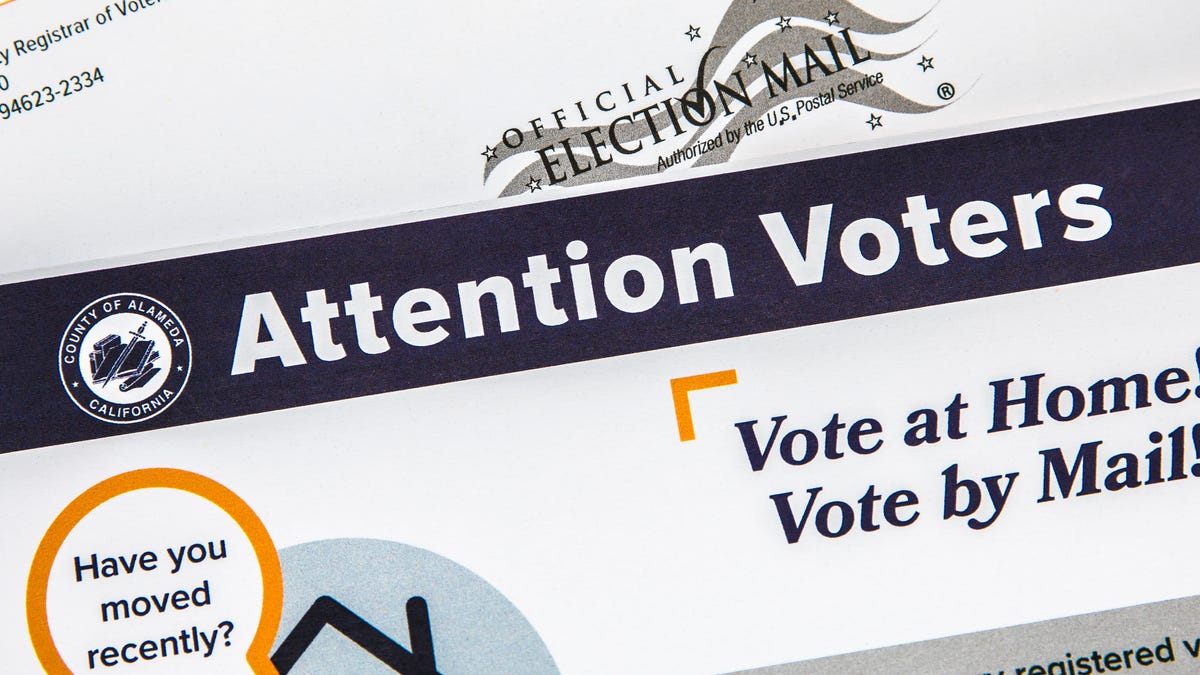FBI: Iran, Russia obtained voter data to interfere with US elections
Both countries have obtained voter registration data, which Iran used to send emails to intimidate voters.

Russia and Iran have obtained voter registration data in an effort to interfere with the 2020 US elections., the FBI says.
The FBI said late Wednesday that Russia and Iran have taken action to undermine US confidence in the upcoming elections. Director of National Intelligence John Ratcliffe said both countries have obtained voter registration data, some of which Iran used to send spoof emails designed to intimidate voters.
"This data can be used by foreign actors to attempt to communicate false information to registered voters that they hope will cause confusion, sow chaos, and undermine your confidence in American democracy," Ratcliffe said in a hastily called news conference Wednesday evening.
Ratcliffe said Iran's spoof emails were "designed to intimidate voters, incite unrest and damage President Donald Trump." Iran has also been linked to a video that suggests individuals can cast fraudulent ballots overseas, he said. It's unclear how Iran and Russia obtained the voter registration information, though much of it is publicly available in multiple states, and some has been exposed in data breaches in the past.
FBI Director Chris Wray said during the press conference that access to voter registration data doesn't mean that your votes can or will be altered.
"We've been working for years as a community to build resilience in our election infrastructure, and today that infrastructure remains resilient," Wray said. "You should be confident that your vote counts."
US officials have already warned of a rampant disinformation campaign from China, Russia and Iran to influence the 2020 presidential election. They've said these efforts could include creating fake websites to show unofficial "winners" of the election, hacking existing poll-tracking websites to alter the results or spreading disinformation on social media to challenge the outcome.
Tensions between Iran and the US escalated earlier this year following US military strikes in response to a rocket attack that killed an American civilian contractor at an Iraqi military base. Iran's government vowed to strike back, and cybersecurity experts warned that Iran could choose a cyberattack to retaliate against the US.
It's unclear how many people received the voter intimidation emails from Iran that the DOJ detailed Wednesday, though researchers from the cybersecurity company FireEye said the scheme targeted Democratic voters in four states.
"In recent years, Iranian information operations have continued to push boundaries using bold and innovative approaches. However, this incident marks a fundamental shift in our understanding of Iran's willingness to interfere in the democratic process," said John Hultquist, FireEye's senior director of analysis. "While many of their operations have been focused on promoting propaganda in pursuit of Iran's interests, this incident is clearly aimed at undermining voter confidence."
Hultquist added that the campaign was designed to stoke existing tensions and prey on fears of election security being vulnerable.
An email campaign targeted Democratic Florida voters on Tuesday and Wednesday, claiming to have "access into the entire voting infrastructure" and looking to intimidate people into voting for Donald Trump. The email addresses were spoofed to come from the extremist right-wing group Proud Boys and included a video claiming to fill out voter registration and cast absentee ballots for voters in Florida, Alaska and Arizona.
Alaska's division of elections said it was aware of the campaign, but said there was no evidence its voter registration systems had been hacked.
"The voter registration list is a public document that may be obtained by individuals and groups, and is available both nationally and internationally," the division of elections said in a statement.
Unlike other disinformation campaigns, which have used social media platforms like Facebook and Twitter to spread foreign influence on elections as widely as possible, this campaign directly targeted voters through emails. While the fake Proud Boys voter intimidation campaign parallels the Justice Department's warnings about Iran and Russia on Wednesday, the agencies didn't confirm if they were the same efforts.
The threatening and bogus email sent to voters on Oct. 21.
Lawmakers and election officials note that these emails are voter intimidation and don't reflect the actual state of election security. On Wednesday, Senate Select Committee on Intelligence chairman Marco Rubio, a Republican from Florida, and vice chairman Mark Warner, a Democrat from Virginia, released a joint statement testifying to the security of voter infrastructure.
"Our adversaries abroad seek to sow chaos and undermine voters' belief in our democratic institutions, including the election systems and infrastructure that we rely on to record and properly report expressions of the voters' will," Rubio and Warner said. "They may seek to target those systems, or simply leave the impression that they have altered or manipulated those systems, in order to undermine their credibility and our confidence in them."
Democratic leaders like Speaker of the House Nancy Pelosi and House Intelligence Committee chairman Adam Schiff said they would be receiving briefings on the interference efforts on Thursday, and urged Americans to vote with confidence this election.
"The bedrock of our democracy is that every citizen has a right to vote and to have that vote count as cast. We cannot allow voter intimidation or interference efforts, either foreign or domestic, to silence voters' voices and take away that right," the lawmakers said in a statement.



